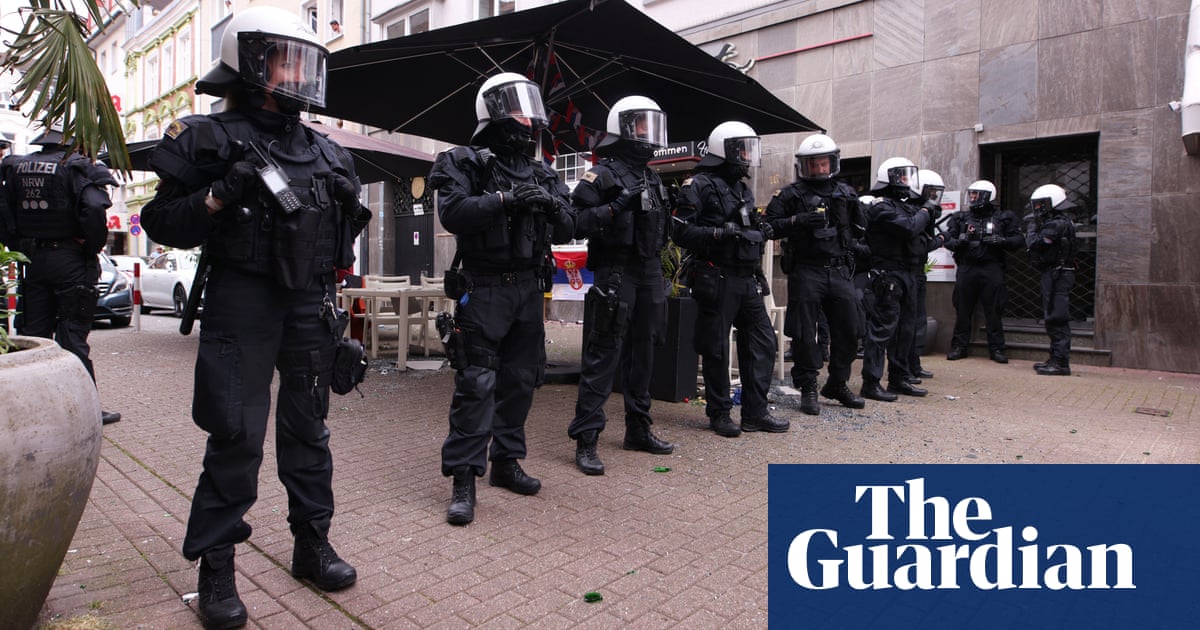
England’s 1-0 victory in the team’s opening Euros game against Serbia was marred by violence earlier in the day, with the arrest of seven Serbs and a warning of banning orders for any UK nationals found to be involved.
A brawl on the terrace of a restaurant in the west German city of Gelsenkirchen five hours before the tie left one police officer and several fans bloodied, although it was unclear who instigated the incident.
Video footage on social media brought back memories of previous shameful episodes for English football with chairs, bottles and tables seen upended in an area of the restaurant where a large Serbian flag had been put up.
A spokesperson for the German police said that “the two fan groups had been separated”, and that “seven Serbian citizens were taken into custody during the clashes”.
The spokesperson added: “There was also a complaint of grievous bodily harm. The background to this is still unclear.”
Some witnesses had claimed that Albanian fans had been the instigators but the Gelsenkirchen police later clarified that those involved were English and Serbian.
A UK football policing unit spokesperson said: “We are aware of an issue in Gelsenkirchen ahead of the England v Serbia match. Our German colleagues have made a number of arrests of what we currently believe to be Serbian supporters. At this stage we do not believe that any UK nationals have been arrested but inquiries are ongoing.
“Our officers are at the location speaking to German colleagues. Our investigation team is now reviewing footage of the incident and if any UK nationals have been involved, football banning orders will be sought.”
One police officer was treated for a head wound and an undisclosed number of fans were seen by medics after hooligans rampaged outside the Hirt Steakhouse, where Serbia and England supporters had been drinking at 3.45pm local time.
“Chairs, bottles, everything you can imagine suddenly came down,” said one witness. One man in his 20s was seen being kicked to the head as he lay prone on the ground. A man from Birmingham is understood to be among those injured.
Many of the perpetrators of the violence had fled the scene shortly before about 200 German riot police arrived in a convoy of blue-lit vans.
The prelude to the violence had been first noticed by British police “spotters” who saw a large group of men of unknown nationality, many wearing only black, rushing towards Arminstrasse, a sidestreet near Gelsenkirchen’s central station.
Riot police were called in and sealed off the area, while smaller squads were dispatched to hunt down those who had fled the scene.
A spokesperson for Gelsenkirchen police said: “We can confirm that there was a physical altercation between several people in the south of the city of Gelsenkirchen.
“We cannot confirm at this point whether the altercation was football related or which nationalities were involved.”
A police spokesperson said they had also been forced to temporarily halt a “largely peaceful fan march” by 4,000 Serbian fans to the Arena AufSchalke after fans set off pyrotechnics. “There were no further incidents on the way to the arena”, the spokesperson said.
More than 30,000 England fans – only 20,000 of whom are believed to have tickets – were in Gelsenkirchen for the game with Serbia.
The match had been designated as “high risk” due to the reputation of the two fanbases, with the police last week warning that up to 500 Serbian hooligans bent on violence could seek to cause trouble.
after newsletter promotion
The game was otherwise peaceful, however, with a heavy German police presence keeping the Serbia and England fans apart for much of Sunday.
Some fans complained of difficulty in making the 15-minute tram journey from the city or in taking the shuttle buses from the fanzone to the stadium.
Scott Culley, 38, a roofer from Southend in Essex, said: “There must have been more than 2,000 people standing in rain for half an hour in a car park.
“It was about 6.45pm and people were getting angry because they didn’t know what was happening. We got here on time in the end because a load of buses turned up. It was awful really.”
Hundreds of other fans were left walking miles as they found themselves unable to find transport to venue but the 50,000 capacity stadium was largely full by the 9pm kick-off.
Rob Tyler, 65, a roofer from Cheltenham, said the match had been well organised. “We were in Essen and used the free shuttle bus,” he said. “It was busy but all worked for us.”
German police said there had been a “lively atmosphere around the stadium” but that there had no been disorder.
British police had been working in close cooperation with their German counterparts, with undercover spotters from both nations working among the supporters drinking in the bars around Gelsenkirchen.
There has been an uptick of football disorder in recent years in England and Wales related to domestic matches, leading to concerns that such behaviour could spill over into internationals.
A downward trend in terms of the number of arrests at domestic football games has been sharply reversed post-Covid, with the number now at the heights of a decade ago.
As of August 2023, there were 1,624 football banning orders in force, an increase of 24% compared with the year before. Within the 2022-23 season, 682 banning orders were issued, an annual increase of 32%.
All those under banning orders had to surrender their passports for the duration of the tournament in Germany.
Source: theguardian.com


















